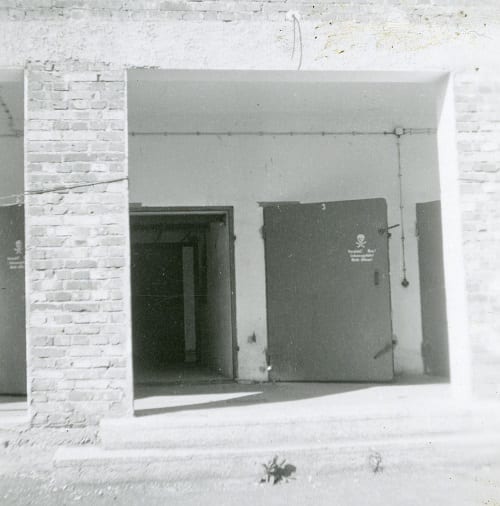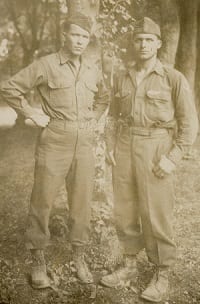
A photograph of the Dachau Concentration Camp gas chambers taken by Wisconsin veteran Jack R. Dewitt likely in April 1945. WVM.0581.I951.04
Written by Luke D. Sprague, Oral Historian
The Holocaust remains one of the most horrific events in human history. During the Second World War, six million Jews were systematically murdered by Nazi Germany. These brutal and inhuman actions remain fresh in the memories of the survivors.
Ensuring that future generations have the knowledge and are aware of the Holocaust continues to be critical for cultural institutions not wanting these heinous acts to go unremembered. Though deeply troubling, it is necessary to document, preserve, curate, and make these resources available to the public.
At the Wisconsin Veterans Museum, we have firsthand accounts of the Holocaust available for your viewing, listening, and research. The following is a media sketch using personal stories from Wisconsin veterans and their experiences with concentration camps. Full interviews are available on request.
CONTENT WARNING!
These accounts contain explicit graphic conversations about starvation, enslavement, torture, murder, death, genocide, war crimes, and other crimes against humanity. The content may be troubling and this should be considered before listening. We appreciate the bravery of the narrators in sharing their stories—please be respectful when engaging with these interviews.
Norman F. Pagenkopf
63rd Infantry Division, U.S. Army
"And on to Munich, then there was Dachau, there was a camp there that we liberated, death camp there…" [WVM OH2082]
Elizabeth K. O'Hara Baehr
Surgical Nurse, U.S. Army
"I thought if only the American people could see what we're seeing here and what these people have gone through.." [WVM OH885]
James R. Underkofler
104th Infantry Division, U.S. Army
"'We didn't know what was going on.' The heck they didn't know what was going on—" [WVM OH879]
Theodore Hartridge
Doctor, 66th Medical Group, U.S. Army
"..and that was Weimar and that was where Buchenwald was, the concentration camp. " [WVM OH405]
Frederick Foerster
Cook, 255th Ordnance Company, U.S. Army
"We went in there, and I look down in, and there was a horse’s head in the bottom of that big vat." [WVM OH364]

Robert Paulson is on the right, his brother is on the left
Robert Paulson
Infantry, 5th Infantry Division, U.S. Army
"And you would go to shake hands with them, they would grab you." [WVM OH425]
Joseph Marek
Assistant Machine Gunner, German Army; Explosives Instructor, Polish Army; Tank Driver, U.S. Army
"—actually on the first day of the invasion on the September 1, that was Friday, by noon I went by the mill, flour mill, they were gone. They sort of disappeared like I don’t know where." [WVM OH2138]
"And this, Auschwitz, was from the—from our—our town maybe ten, twelve miles."
Donald M. Murphy
Radio Operator, U.S. Army
"So you knew immediately, this was not a friendly place. And we didn’t know quite what to do about it. We radioed it in right away..." [WVM OH567]
Anthony J. Richtsmeier
Medic, 3rd Auxiliary Surgical Group, U.S. Army
"And what they lived in, it was boarded up bunks with straw and it would be probably the size of these filing cabinets." [WVM OH597]
Robert W. Evans
Driver, 42nd Infantry Division, U.S. Army
"We asked them, do you know what goes on out there? And they said, 'What do you mean, it is just a camp.' And we said, 'No they're killing...'" [WVM OH1971]
John Wozniak
Escort guard, 437th Military Police Company, U.S. Army
"These people here, we are not serving them any, just liquids, solid foods, just fluids." [WVM OH255]
"Eisenhower urged that as many people could possible get away to see it firsthand so that when you get back home and somebody says 'Ah, propaganda,' you’ll say, 'But I was there. You weren’t.'"

